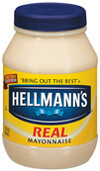Hellmann’s Gets Real
What do you do when the world seems obsessed with dieting, fat and calories? When every product is promoting it is low-fat, fat-free, low-carb, high fiber or zero calorie? When everybody is on a diet, gobbling up calorie reduced manufacture foods yet still hungry, miserable and (at least in the U.S.) fat?
It is the dilemma facing most food and beverage brands today. Some products have the luxury of being all-around healthy award winners like water.
But most foods always have a downside. Too much fat, sugar, carbs, cholesterol, chemicals or calories. Or they taste terrible like brussel sprouts.
Most foods also usually have something good about them too. But then there are some foods that are simply viewed as the all-around food enemy.
So what do you do when you are selling the enemy? A high calorie, high cholesterol, high fat, diet sabotager.
Most companies would just promote the diet and light versions of the product. Then try not to make consumers feel too guilty when they continue to buy the regular stuff since it tastes much better. Not a good strategy.
Hellmann’s Mayonnaise was getting crushed by Kraft’s Miracle Whip which has half the fat of mayonnaise. Hellmann’s fought back with light and other versions. But as soon as you put diet, light or reduced on the label, instantly the product tastes bad in the mind.
The beauty of Miracle Whip is that the brand itself represents the low-fat idea. Like Snackwell’s did in cookies. Good strategy.
But Hellmann’s has recently struck back by taking a word that has been on the label for years and turning it into a powerful strategy. REAL.
Hellmann’s Real Mayonnaise.
Nothing beats the real thing. Real is such a powerful idea, especially when it has an authentic connection to a brand like it does with Hellmann’s and Coca-Cola. Not using it is a first-degree branding crime.
I was impressed and delighted when I saw the new ad campaign and marketing program from Hellmann’s which reinforces the “Real” idea.
Hellmann’s Real Mayonnaise. Real. Simple. Made with eggs, oil and vinegar.
The ads and PR efforts talk about the power of “real food.” Why eat a manufactured glob of chemicals when you can enjoy real food? It is a hard question not to answer on the side of real. Calories are important but so is quality and purity.
There is always opportunity at the extremes. While there is a strong trend toward dieting there is also a trend towards whole foods. Hey there is a store called Whole Foods which says no to stocking any products containing artificial sweeteners. Its mission: To offer the highest quality, least processed most flavorful and naturally preserved foods. Because food in its purest state — unadulterated by artificial additives, sweeteners, colorings and preservatives — is the best tasting and most nutritious food available.
Whatever your brand is, you have to deal with it. Pretending it isn’t high fat isn’t going to change what’s in the package. And promoting your “light” version just reinforces in the mind of consumers how “fattening” the regular version must be.
Like food, a brand is best when it is real, simple and focused. If opportunity strikes in another direction, companies should launch a new brand.
Bud Light and Diet Coke would each have been better off as new brands instead of extensions. But leaders can get away with such mistakes. And the success of the diet versions comes at a high cost to the regular varieties both in sales and strategy.
The strategy of the regular brand is sabotaged by the existence of the diet extension bearing the same name. What Budweiser needs to say is “Why drink watered down sissy beer when you can have the King of Beers?” What Coca-Cola needs to say is “Nothing beats the Real Thing.”
All brands need to be real. If not, they are weak, meaningless and tasteless.
 ?>
?>
